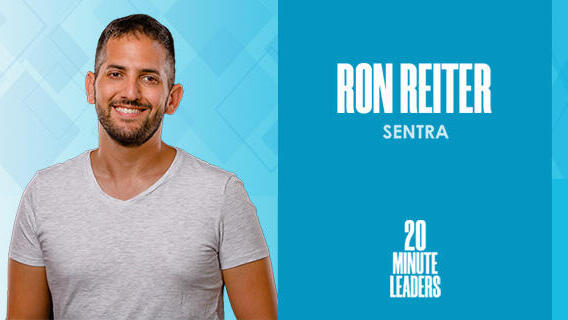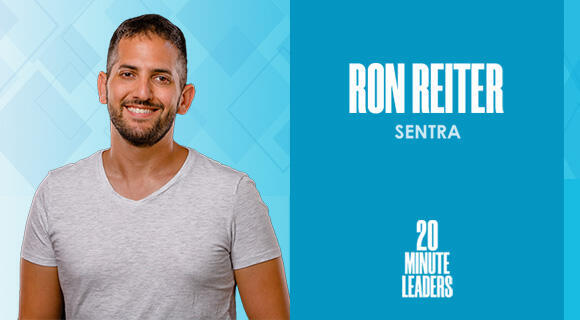
20-Minute Leaders
“Make sure that you want to marry your co-founders before you start a company.”
Being too focused on reaching goals is not a good approach to entrepreneurship, says Ron Reiter, co-founder and CTO of Sentra.
Being too focused on reaching goals is not a good approach to entrepreneurship, says Ron Reiter, co-founder and CTO of Sentra. He shares that he was too wrapped up in the goal of selling his previous startup and it wasn’t healthy. With Sentra, he took a different approach: doing what he enjoys and not letting its success or failure define him. Reiter explains that he is a builder, and he has learned to think bigger than the technology to see the company itself as his building project. He has to balance his time between the internal product and management work as well as external work advocating for the company. Reiter is one of four co-founders of Sentra, which builds a data security product for the cloud. He compares the relationship between co-founders to a marriage, legally and conceptually, so he advises entrepreneurs to choose their founding partners very carefully.
Click Here For More 20MinuteLeaders
First of all, 30,000 feet in the air, who is Ron Reiter? How do you think about yourself?
I think you would find that I'm very central in the Israeli ecosystem of startups. A lot of people know me, usually with a good reference as someone who is fun to work with and strong technically. The reason is mostly because I care about relationships. I meet a lot of people. I mingle a lot. I create a lot of forums and groups. It's very important for me for people to like me.
Why is this an important part of your success?
The formal answer is that I think entrepreneurship is very much based on relationships and connections. Managing people is also about relationships and being good with people. If you want to be a good entrepreneur, you have to make sure that people like you and like working for you. As a developer, it's really not important. But it is important for entrepreneurs or managers.
But the non-formal answer is that it's just some sort of mental issue I have. I think it comes with a big toll. If you care too much about what people think about you, it's not always a good life.
What is your leadership style like?
I lead by example, and I manage people by empathizing with them. I see what they want to achieve and I tell them, basically, "I can help you become what you want; just follow me and trust me." This is the message that I try to lead with.
I think in terms of being an entrepreneur in general, I see myself as someone who people want to be. I tell people who work for me, "If you want to be a successful entrepreneur, this is what you need to do. You have to work for me and see how startups are being done." That works for like 50 people. After 50 people, what you need to do is build a company. Then it becomes a game of culture. You have to build a culture of people that people want to join in regardless of my direct leadership.
Tell me about your own internal balance: the engineer, the CTO, and the leader who is trying to help people.
Personally, I actually really like to code. I have this constant dilemma between looking inbound and seeing what's going on in the technology versus going outbound and understanding how people see us as a company. I'm balancing between these two.
I think it's very hard for me because I'm an introvert; I want to focus on the inside and focus on building something. I'm a builder. But what I taught myself to do is to look at the company as what I'm trying to build. Then you have to understand the dynamics of the world and understand that you have to build a great culture.
I would say 30% of my time, I give to actually working on technology, focusing on the product. And 30% is more about building the company in terms of the leadership, the culture, the management. The other 40% is things that I actually enjoy less, which is to go outwards and advocate for my company.
Tell me about Sentra and what you are doing.
Sentra is a data security company. We are building something called a DSPM (Data Security Posture Management) solution. Basically, what Sentra does is it connects to your public cloud account and SaaS and PaaS, for example, Snowflake, and understands where all your sensitive data is automatically, using an agentless approach. It discovers all the data, finds sensitive data using classification, and then understands the security posture of it. For example: Is the database secure that's holding sensitive data? Is the data being copied? Is it moving somewhere that's not supposed to? Then we generate alerts based on policies.
I have three co-founders: Yoav Regev, who is the CEO; Asaf Kochan; and Yair Cohen, a VP product. Four co-founders, 40 people. We already have paying customers.
Take me back to those first days of just starting out. What are some of the underlying understandings that you have about the world?
In general, what I understood is I know I want to build a big company, a company that solves a big issue, and I want to be beneficial for the world. I've noticed that there has been this huge gap in the world in terms of data, that people don't understand enough how the problem of securing your data is going to be huge in the next decade. The world is becoming more and more data-centric. Everyone's monetizing on data.
This usage is basically causing a security issue because the usage of data is about copying data to places. Using the data kind of interferes with the need to secure the data. If you want to secure it, you have to make sure that it doesn't get replicated and that no one is touching the sensitive data which isn't authorized. There is no product today that can automatically understand where your sensitive data is and monitor the functions that actually cause potential data leaks in real time.
We started with a problem, and slowly we understood where the problem is right now, where we need to focus. We decided to focus on the public cloud infrastructure first. But overall, the problem was clear, people in the enterprises do not know where their sensitive data is.
It sounds like this is the type of problem that gets exacerbated over time. We are creating a world where data lives everywhere and our ability to maintain the integrity of where it is is lacking, right?
Exactly. That is exactly the problem we are solving. Most of the enterprises don't even have a significant amount of data footprint on the cloud. Even if they have cloud, they haven't even begun to utilize it. We are just at the beginning of this data explosion.
Going into this journey after a few years at Oracle and selling your previous startup, how did you approach this journey differently? What did you learn from your previous experiences?
I think the most significant by far is the way that I approach entrepreneurship. Previously, in my first startup, I was only thinking about succeeding. I was thinking about selling my company and nothing else. That is not a very healthy way to live your life. It led me to really bad places. I really felt like I lost a few years of my life because of that. But eventually, I was lucky enough to sell my company and it was a great outcome. But what I learned is that this is the wrong approach.
What you need to do is you need to wake up every morning and ask: Are you enjoying your life? Do you go to work happy? If the answer is no, then you need to change something. I realized that what I enjoy is the act of starting a company. Mentally wise, I don't care if my company crashes for some reason a year from now. It's not something that defines me. I don't feel that it will make me less of a person if that happens. That realization is really what I took with me.
I think that the second most important thing is about relationships in your co-founding team. Really getting into a company and getting co-founders is not less than marriage. Really, legally and conceptually, it's kind of the same. You have to really love, appreciate, respect, and admire the person that you are working with. So make sure that you want to marry your co-founders before you start a company.
Michael Matias, Forbes 30 Under 30, is a Venture Fellow at Innovation Endeavors as well as investment Venture Partner at Secret Chord and J-Ventures. He studies Artificial Intelligence and Human-Computer Interaction at Stanford University, and was an engineer at Hippo Insurance. Matias previously served as an officer in the 8200 unit. 20MinuteLeaders is a tech entrepreneurship interview series featuring one-on-one interviews with fascinating founders, innovators and thought leaders sharing their journeys and experiences.
Contributing editors: Michael Matias, Megan Ryan

